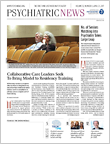From the mental health of college students of color to the advancement of women in the mental health profession, several aspects of diversity and health equity in psychiatric practice will be discussed at this year’s Annual Meeting.
“Conversations around diversity allow for awareness of biases that may be presented toward a particular group of people during an interaction between clinician and patient or between a clinician and colleague,” Ranna Parekh, M.D., director of APA’s Division of Diversity and Health Equity, told Psychiatric News.
Previous research suggests that such biases can negatively impact patient outcomes, further increasing health disparities.
Parekh said as the population of the United States continues to become more diverse, improving quality and access to health care among all cultural and racial backgrounds is critical. This year’s sessions on diversity and health equity, she said, will highlight strategies that can be used to reduce disparities in mental health care.
One featured session is “Focusing on the Mental Health and Emotional Well-Being of College Students of Color,” sponsored by the Steve Fund. The fund is in memory of a young African-American graduate of Harvard University who died by suicide in 2014.
“Research shows that young people of color are not getting their mental health needs met,” said Annelle Primm, M.D., M.P.A., the session chair and senior medical advisor to the Steve Fund. “This can be attributed to many factors including stigma and lack of access to culturally sensitive mental health care on college campuses. … The barriers that block mental health treatment among these college students warrant our attention.”
Panelists will discuss their experiences of providing mental health care to students of diverse backgrounds in a racially charged, homophobic, and transphobic society. They will also discuss the importance of avenues to increase students’ access to mental health services such as crisis hotlines, peer counseling programs, and campus medical professionals.
The conversation on meeting the mental health needs of minority populations will continue in a session with clinicians from the Department of Psychiatry and Behavioral Sciences at Stanford University School of Medicine. In “Theatrical Vignettes as an Educational Tool to Improve Communication in Asian-American Families,” they will describe how they are using theatrical vignettes to improve communication between Asian-American parents and teenagers.
“Family expectations to achieve academically is a leading stressor among Asian-American teens, putting them at risk for depression and suicidal behaviors,” said Rona Hu, M.D., medical director of the Acute Psychiatric Inpatient Unit at Stanford. “The culture and self-expectation that the parents experienced as adolescents in their country can be very different from those of their Americanized teens,” Hu added. “We saw an opportunity to help these families with a therapeutic method that has no side effects.”
The theatrical vignettes are written and acted out by faculty, residents, and medical students of Asian descent. Each vignette presents a problematic situation concerning the teen such as bad grades or issues regarding social life. The presenters offer two responses that are typical of parents: one that may increase the teen’s likelihood to become emotionally distressed or rebellious, and another that may open the line of communication between parent and teen. Hu told Psychiatric News that the vignettes have received positive feedback as it relates to improving relations between parent and teens. She hopes that the session will inspire other academic institutions to create their own vignettes that are specific to the cultural demographics of their community.
Residents and faculty from the Department of Psychiatry at Yale School of Medicine will sponsor “The New Face of Diversity: Yale’s Social Justice and Mental Health Equity Residency Curriculum.” This session will describe how the department is educating residents on connections between social justice and mental health care.
Presenters will describe the curriculum that is required throughout each year of residency and its four courses. They include “Cultural Psychiatry,” which focuses on the disparities in mental health care; “Exploring Bias,” which covers the social determinants of health associated with bias, racism, and privilege; “Structural Competency,” which provides an understanding of the challenges faced by populations in the five surrounding neighborhoods of New Haven, Conn.; and “BioPsychoSocial,” which addresses arriving at a correct diagnosis and devising culturally sensitive treatment plans.
“From our session, we hope attendees realize that learning about cultural competency is just as important as learning about neuroscience. Knowledge of both is necessary to improve patient outcomes in mental health care,” said session chair Kali Cyrus, M.D., M.P.H., a fourth-year resident at Yale and second-year APA/SAMSHA fellow.
Discussions of cultural competency at academic institutions will continue with the session “Beyond Cultural Competency: How to Introduce a Discussion About Health Disparities Into One’s Department/Organization,” chaired by Kari Wolf, M.D., chair of psychiatry at Southern Illinois University School of Medicine.
A panel discussion about retaining and advancing women in academic psychiatry will feature Gail Robinson, M.D., a professor of psychiatry and obstetrics/gyncecology at the University of Toronto, and guest speaker Apoorva Mandavilla, the founder and editor-in-chief of Spectrum, a source of news for scientists interested in autism spectrum disorder. Robinson is APA’s minority/underrepresented group trustee.
Additional sessions on diversity and health equity can be found in the APA Meetings App and the program guide available on site. ■

